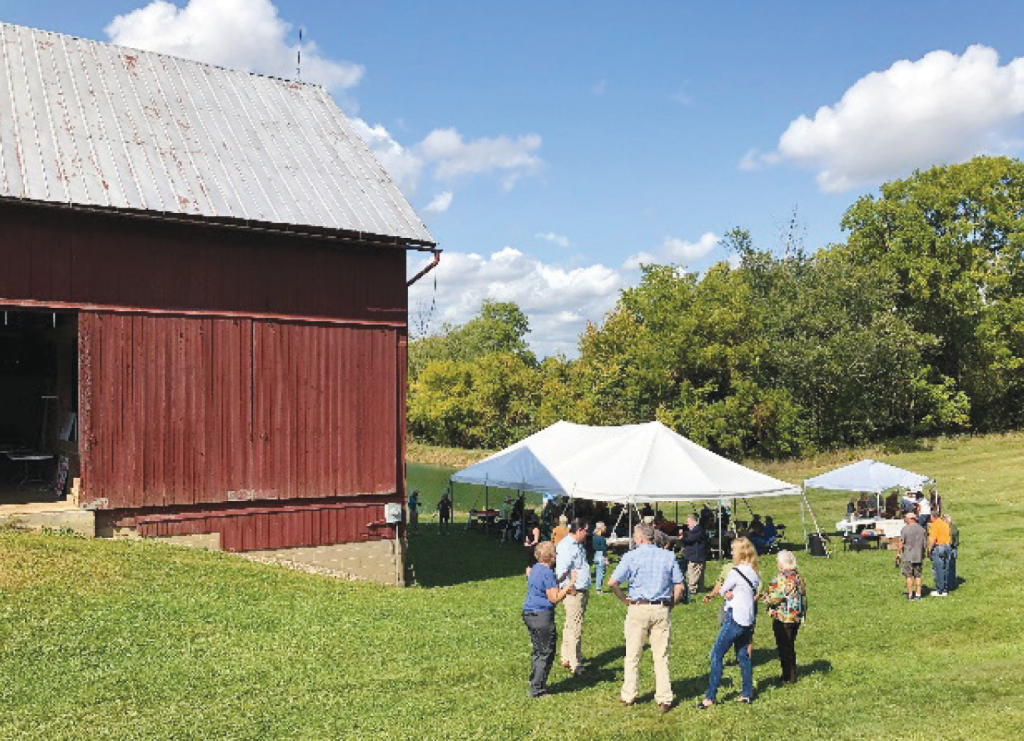Fall Newsletter 2020
UNDUE INFLUENCE CASE
Undue Influence Invalidates Last Will and Testament
It is not unusual for potential or actual heirs of a deceased person to be surprised or upset if they have been disinherited or their inheritance is not what they expected. In a case out of Huron County, Ohio, the trial court and then an appellate court enforced a jury verdict invalidating the last will and testament of Rita Rose Justi (“Rita”).
Rita had three daughters: Roberta, Pamela, and Bonnie. The last will and testament at issue in the case was dated October 23, 2014. Rita died on November 26, 2016. Rita’s husband and the father of the daughters died on September 1, 2013.
When both parents were alive, Pamela visited every day and helped her parents with various tasks. The parents’ condition was described as “feeble” during their final years. After the father’s death, Roberta started visiting more often. Roberta and Pamela didn’t get along, and eventually Rita moved into Roberta’s home. At trial, testimony was given that Roberta told Pamela to stay away from Rita at that point.
Eventually, Rita moved into a nursing home. Rita executed a new last will and testament, which named Roberta as her sole heir and disinherited Pamela and Bonnie. Rita, however, already suffered from dementia and a host of other problems at the time of execution of the new last will and testament.
While witnesses gave a mix of testimony at the jury trial, the jury found that the last will and testament was not valid. The probate court then issued a judgment entry invalidating the October 23, 2014 last will and testament.
While Rita had been diagnosed with dementia prior to execution of the last will and testament, she had not been legally declared mentally incompetent. The appellate court noted that “[t]he issue of competency is determined by reference to the mental condition of the testatrix at the time of execution of the will” and that “[i]ncompetency may be established by a lay witness who observed the mental state of the testatrix and could assess whether the person was of sound mind to make a testamentary disposition.” The appellate court, however, found that the trial court record did not contain “clear and convincing evidence that Rita lacked testamentary capacity.”
The appellate court did find sufficient evidence of “undue influence” to invalidate the will. In other words, enough evidence was provided for the jury to conclude that: (1) Rita was a susceptible party; (2) another (Roberta) had an opportunity to exert influence over Rita; (3) improper influence was exerted or attempted; and (4) evidence of the results showing the effect of such influence (i.e., Bonnie and Pamela were disinherited and Roberta became the sole beneficiary).
If you want a copy of the case (Yurkovich v. Kessler), call 614-210-1840 or send an email request to mcpelot@farmlawyers.com.
NEW CLIENT PORTAL AVAILABLE
BECE began using a new software platform for client contact information and management at the end of last year, and we continue to make use of more features available to clients. Many of you have experienced our new billing process. A few of you have begun to use our client portal to exchange documents back and forth in a more secure manner than ordinary email.
As you need to send documents to us or need copies of documents from your file, you may want our firm to set up this new feature for you. If so, please let us know, and we will send you an email with the link for setting up a username and password. We just need to know the email address to which you would like the link sent.
For those of you who have already set up client portals and need to re-access the portal, the web address is https://client.cosmolex.com/#/login. We also added a link to the login page on our Contacts page on our website immediately below our address and telephone number.
FARMLAND AND HISTORIC BARN PRESERVATION

On September 26, 2020, more than 100 people, including the donor, a U.S. Congressman (Bob Gibbs of Ohio’s 7th District), other elected officials, Ashland County Park District officials, park district volunteers, and other friends and family, gathered as the Ashland County Park District held a dedication of its newest park, Avian Acres Farm Park.
Louaine Leisching, along with the unanimous support of her family, donated approximately 300 acres in Ashland County to be used as a public park with a working farm and public agricultural education facility. The extremely generous gift will preserve farmland, educate the public on farming practices, and provide an opportunity for the public to escape to the beautiful outdoor setting for recreation and enjoyment.
The Park District will continue to farm approximately 120 acres of cropland and will continue maple syrup production. The Park District expects to create miles of trails for hiking and horseback riding through 100 acres of woods, some of which include majestic great white oaks that could be as much as 300 to 400 years old. The new park also includes 80 acres of wetlands.
Unfortunately, Avian Acres Farm Park is not yet open to the public. The Park District needs to build a new access road and begin some of the planned enhancements of the property for public use. The Park District hopes to have an opening in 2021.
The centerpiece of much of the public education portion of the park will center around the historic barn. The oldest portion of the barn was constructed beginning in 1820 and is the oldest documented barn in Ashland County. The barn was later raised in the 1880s. The Park District plans to preserve the barn and continue farming. Part of its mission is to preserve our agricultural heritage.
ESTATE PLANNING UPDATES
The end of 2020 could bring a close to significant gifting opportunities depending on the results of the November 2020 elections. The federal applicable exclusion amount for both gift and estate tax is currently $11,580,000, with a 40% estate tax rate for any transfer that exceeds that exclusion amount. This exclusion amount is indexed for inflation each year and is set to reduce by half in 2026 if Congress does not enact any additional changes. However, some candidates for Congress and some members of Congress have proposed a reduction of the exclusion amount to $3,500,000 for estate tax purposes and $1,000,000 for gift tax purposes.
Joe Biden has proposed to repeal the step-up in basis (as part of his $4 trillion tax increase), with some commentators believing his plan would tax the unrealized capital gains on any transfer, including gifts, occurring during life or at death. This could create an additional layer of tax that does not normally apply at the time of gift or death. He also plans to almost double the tax rates on gains for those with income over $1,000,000 (20% to 39.6%). Most individuals reading this do not have over $1,000,000 of income annually, but an estate with a 200-acre farm that has appreciated $5,000 per acre over the last 20 years will have $1,000,000 worth of income in that hypothetical situation. Likely many of you reading this would face this situation with a farm, family business, or investment portfolios. Including the Obamacare tax, it appears those gains could be taxed for federal purposes at 23.8% and gain in excess of $1,000,000 at 43.4%.
Repeal of the step-up in basis has failed in the past because it is administratively cumbersome and expensive to administer. Most recently in 2010 when the estate tax was repealed, the government repealed the full basis step-up but provided a limited basis step-up for lower valued estates. Congress restored the full basis step-up (and the estate tax) for 2011.
The details of what might be enacted in 2021 are not known at this time, but this could be a good year to make large gifts before changes are enacted. The uncertainty for planning in 2020 is similar to the uncertainty we faced in 2010 and 2012. Significant gifts were made in those years, and that may be the case this year. If you have any desire to make gifts yet this year, we encourage you to not wait until the very end of the year to start the process. For example, you may want to get on the schedule of an appraiser so you know there will be time to complete the appraisal before the gift.
If you have any questions about gifting or estate planning, contact Russell Cunningham at rcunningham@ohiocounsel.com.
CONGRATULATIONS TO GARY GEARHARDT
Congratulations to Larry Gearhardt on his selection as a 2020 inductee to the Ohio Agricultural Hall of Fame!
Larry serves of counsel at Barrett, Easterday, Cunningham and Eselgroth and volunteers with Ohio Northern University’s Agricultural Law program - the only one of its kind in Ohio and one which Gearhardt was a driving force in establishing.
You can find more information about Larry and his honor on the Ohio Agricultural Council’s website at: http://www.ohioagcouncil.org/hall-of-fame-inductees/. When you go to the website, you also can link to the Hall of Fame video featuring Larry.
COMING SOON: BECE OFFICE IN BISMARK, NORTH DAKOTA
As many of our clients know, BECE works with firms and local counsel throughout the U.S. on transactional and dispute resolution issues. Within the next several months, BECE will open a branch office in Bismarck, North Dakota. BECE Managing Partner David Barrett will be located in Bismarck and will remain involved in our Dublin office using all of the electronic communication methods now in place. More information will be posted on our website when the new office officially opens.
David devotes the majority of his practice to serving the needs of agribusiness clients (primarily grain, feed, and processing firms) throughout North America, including corporate governance, commercial transactions, commercial civil litigation, mediation and arbitration. He is a frequent speaker on agricultural contract and business legal issues at industry meetings throughout the U.S.
David is admitted to practice in all state and federal courts in North Dakota and Ohio, along with federal courts throughout the U.S. including the U.S. Supreme Court. He also has been appointed by the U.S. Surface Transportation Board to its 11-member Roster of Arbitrators eligible to address rail rate and practice complaints.
DID YOU KNOW
Ohio law requires that all leases exceeding three years be both signed and notarized to be enforceable. Long-term leases often are recorded as well to protect the tenant should the landlord die (if an individual), cease to exist (if an entity), or should the property be transferred to someone else during the lease term. The parties often agree to record a summary memorandum of lease rather than the full lease.
Leases of three years or less generally are enforceable without notarization, but it is still a good practice to have a well-written and properly executed lease regardless of the length of the lease term.
Contact us if you have questions or need assistance with agricultural or other business leases.
